
Elizabeth Cleghorn Gaskell, often referred to as Mrs Gaskell, was an English novelist, biographer and short story writer. Her novels offer a detailed portrait of the lives of many strata of Victorian society, including the very poor. Her work is of interest to social historians as well as readers of literature. Her first novel, Mary Barton, was published in 1848. Gaskell's The Life of Charlotte Brontë, published in 1857, was the first biography of Charlotte Brontë. In this biography, she wrote only of the moral, sophisticated things in Brontë's life; the rest she left out, deciding that certain, more salacious aspects were better kept hidden. Among Gaskell's best known novels are Cranford (1851–53), North and South (1854–55), and Wives and Daughters (1865), each having been adapted for television by the BBC.

Dalkey is an affluent suburb of Dublin, and a seaside resort southeast of the city, and the town of Dún Laoghaire, in the historic County Dublin, Ireland. It was founded as a Viking settlement and became an active port during the Middle Ages. According to chronicler John Clyn (c.1286–c.1349), it was one of the ports through which the plague entered Ireland in the mid-14th century. In modern times, Dalkey has become a seaside suburb that attracts some tourist visitors.
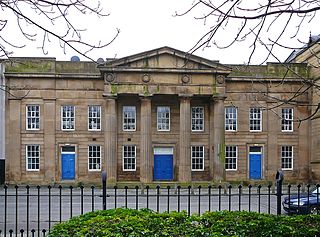
Chorlton-on-Medlock is an inner city area of Manchester, England.
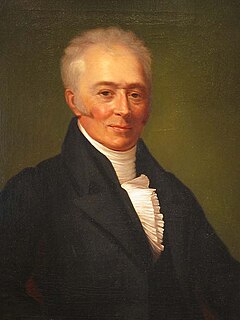
Samuel Greg was an Irish-born industrialist and entrepreneur of the early Industrial Revolution and a pioneer of the factory system. He built Quarry Bank Mill, which at his retirement was the largest textile mill in the country. He and his wife Hannah Greg assumed welfare responsibilities for their employees, many of whom were children, building a model village alongside the factory. At the same time, Greg inherited and operated a slave plantation in the West Indies.

Pendlebury is a town in the City of Salford, Greater Manchester, England. The population at the 2011 Census was 13,069. It lies 4.1 miles (6.6 km) northwest of Manchester city centre, 3.4 miles (5.5 km) northwest of Salford, and 5.9 miles (9.5 km) southeast of Bolton.

John Henry Reynolds was a British educationist and administrator, particularly associated with the development of the Manchester educational institution that was to go on to become UMIST.

Saint Mary's Hospital is a hospital in Manchester, England. It is part of Manchester University NHS Foundation Trust. Founded in 1790, St Mary's provides a range of inter-related services specifically for women and children.

Sir Robert Shaw, 1st Baronet of Bushy Park, Dublin was a Tory UK Member of Parliament who represented Dublin City from 1804 to 1826.

Edward Welby Pugin was an English architect, the eldest son of architect Augustus Welby Northmore Pugin and Louisa Barton and part of the Pugin & Pugin family of church architects. His father was an architect and designer of Neo-Gothic architecture, and after his death in 1852 Edward took up his successful practice. At the time of his own early death in 1875, Pugin had designed and completed more than one hundred Catholic churches.
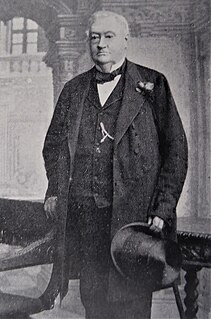
Thomas Bayley Potter DL, JP was an English merchant in Manchester and Liberal Party politician.

84 Plymouth Grove, now known as Elizabeth Gaskell's House, is a writer's house museum in Manchester. The Grade II* listed neoclassical villa was the residence of William and Elizabeth Gaskell from 1850 till their deaths in 1884 and 1865 respectively. The Gaskell household continued to occupy the villa after the deaths of Elizabeth and William. The death of Elizabeth Gaskell's daughter, Margaret Emily "Meta" Gaskell, in 1913, brought to an end the Gaskells' residence there.

William Gaskell was an English Unitarian minister, charity worker and pioneer in the education of the working class. The husband of novelist and biographer Elizabeth Gaskell, he was himself a writer and poet, and acted as the longest-serving Chair of the Portico Library from 1849 to his death in 1884.
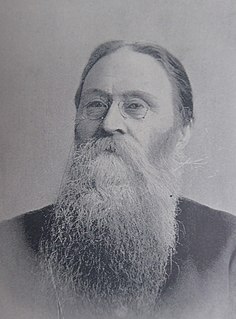
Alfred Darbyshire was a British architect.
Ellen Smyly was an Irish charity worker.
The Together Trust is a charity based in Cheadle, Greater Manchester, which has services covering North West England. It was founded in 1870 by Leonard Kilbee Shaw and Richard Bramwell Taylor as the Manchester and Salford Boys' and Girls' Refuges and Homes. The charity provides care, special education and support services for children, young people, adults and families with autism, learning disabilities, physical disabilities, complex health needs and emotional and behavioural difficulties. It also has a fostering agency.
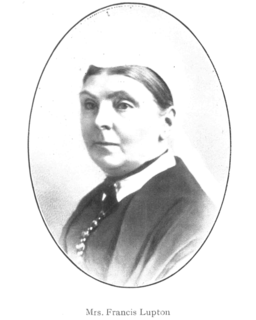
Frances Elizabeth Lupton was an Englishwoman of the Victorian era who worked to open up educational opportunities for women. She married into the politically active Lupton family of Leeds, where she co-founded Leeds Girls' High School in 1876 and was the Leeds representative of the North of England Council for Promoting the Higher Education of Women.

Hannah Greg, with her husband Samuel Greg, was the architect of a paternalistic industrial community in the north of England, a prominent Unitarian and significant diarist. While her husband Samuel Greg pioneered new ways of running a cloth mill, she supervised the housing and conditions of the employees, including the education of the child workers. The Gregs, despite family connections to the slave trade, were considered enlightened employers for the time, and though in the 1830s the apprentice system was questioned, Quarry Bank Mill maintained it until her death.

Fr Peter McVerry, SJ is a Roman Catholic priest, notable for battling homelessness in Ireland. According to one report, the trust which he founded helped 3,600 homeless people in Dublin in 2013.
Kirwan House or The Female Orphan House was a protestant run female orphanage on Dublin's North Circular Road.
William McKerrow was a Scottish minister of the Presbyterian Church of England who had a particular interest in education. He lived for most of his life in Manchester, England, where he immersed himself in the radical politics prevalent there at the time.















